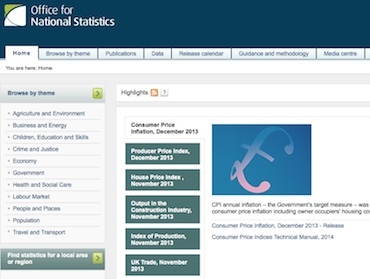The inflation rate dropped even further last month, taking it to the lowest level since records began, at just 0.3%.
December's figure of 0.5% had been the joint lowest since CPI was measured but it fell another 0.2% in January.
The Office of National Statistics reported this morning: "The rate of inflation faced by households has fallen to its lowest level on record.
{desktop}{/desktop}{mobile}{/mobile}
"The Consumer Prices Index, which measures changes in the prices of the goods and services bought by households, increased by 0.3% in the year to January 2015, down from 0.5% in December 2014.
"With the rate of inflation slowing, commentators are considering the possibility of deflation – where prices, overall, become cheaper than they were previously. While some prices (such as motor fuels and food) are lower than they were a year ago, others (such as clothing and furniture) are rising."
Vanessa Owen, LV= head of annuities and equity release, said: "The fall in the rate of inflation is great news for those concerned about the cost of living. This is particularly important for retirees as they are often hit hardest by rising inflation. This section of society often spends a significantly higher percentage of their disposable income on bills, such as electricity.
"With people spending longer in retirement, the risk of inflation reducing the value of their capital is an issue that needs to be considered when deciding how to take an income from their pension fund, especially for those who are planning to take their savings as a lump sum.
"There are retirement solutions available that provide an element of inflation-proofing, yet the majority of retirees buy annuities on a level basis. However, since the Budget, we have seen this start to change, with those approaching retirement now looking for alternatives such as income drawdown, fixed term and investment linked annuities. We always encourage savers to shop around in order to make the most of their pension pots and achieve the level of income and flexibility they require."
Ben Brettell, senior economist, at Hargreaves Lansdown: "The Bank of England expects the rate of inflation to drop below zero for at least a couple of months this spring, and remain close to zero for the rest of the year.
"If it turns negative this will be the first 'deflation' experienced in the UK since the 1960. Mark Carney was at pains to point out last week that risks of a deflationary slump were minimal, but MPC member Martin Weale (who until December had voted for higher rates) explained that the risk of low inflation expectations causing a deflationary spiral was what persuaded him to abandon his calls for a rate rise."
He added: "The combination of low inflation, rising wages and falling fuel prices are great news for the UK consumer. Last week the Bank of England forecast real after-tax incomes would rise 3.5% this year, the strongest growth for 10 years. This in turn should be positive for economic growth, and this is reflected in upgraded forecasts from the Bank of England, Confederation of British Industry and the NIESR. These suggest the UK economy will grow between 2.7 and 2.9% this year."

